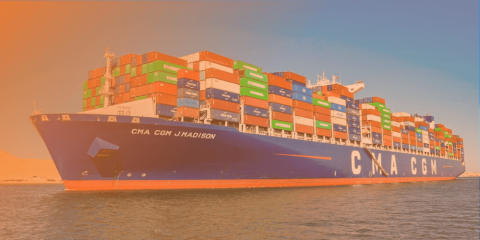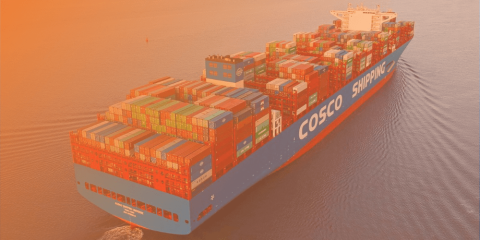Baran Baş
Introduction
In July 2023, the Turkish Competition Board (“TCB” or “Board”) cleared the establishment of a joint venture in Egypt’s Red Sea/Suez Canal region between Hutchison Ports, COSCO Shipping (through its Golden Chance Investment subsidiary), and CMA CGM (through CMA Terminals)[2]. The decision approved this foreign-to-foreign joint venture, RED SEA JV, under Türkiye’s merger control regime. Despite the venture’s operations being entirely outside Türkiye, the Board conducted a substantive analysis of competitive effects in the Red Sea/Suez Canal region with a cautious approach.
This case provides a notable example of how the TCB applies Turkish competition law extraterritorially pursuant to Article 2 of Law No. 4054 on the Protection of Competition (“Law No. 4054”), which embodies the effects doctrine in Turkish competition law[3].
This information note first summarizes the Board’s substantive assessment of the transaction. It then discusses Article 2 of Law 4054 and the effects doctrine as the legal basis for the Board’s extraterritorial reach.
The Board’s Clearance Rationale
In reviewing the RED SEA joint venture, the TCB confirmed that the transaction qualified as a notifiable concentration under Turkish merger control regime.regime. The JV was established as a full-function, jointly controlled undertaking, and the parties’ individual Turkish turnovers exceeded the applicable thresholds. Although the venture would operate entirely outside Türkiye, the Board asserted jurisdiction pursuant to Article 2 of Law No. 4054, which enables extraterritorial review where foreign transactions may affect Turkish markets. After asserting jurisdiction, the TCB assessed the RED SEA joint venture’s competitive impact. Although the JV operates solely in Egypt, the TCB conducted a cautious review of both regional market dynamics and potential indirect effects on Türkiye. Finding no competitive concerns in Turkish markets, the transaction was cleared unconditionally.
The Board’s decision determined the relevant product and geographic markets affected by the JV. The Board defined the relevant product market as container terminal services and considered the geographic scope at a regional level, particularly the Red Sea and Suez Canal corridor, given the JV’s strategic location. It assessed the competitive landscape among port operators in the region and the global positions of the parent companies. While COSCO and CMA CGM are major shipping lines and Hutchison is a leading terminal operator, the Board found no significant horizontal overlaps in port operations. The JV represented a new terminal at Ain Sokhna port of Egypt, and the parties’ existing facilities in the region were viewed as complementary.
The European Commission also reviewed the transaction under a simplified procedure, signaling limited horizontal concerns.
Regarding shipping services, although COSCO and CMA CGM both serve routes that include Türkiye, the JV does not involve their liner shipping operations, but only container terminal activities. Thus, any coordination risks in shipping fell outside the merger review and would be addressed under Article 4 of Law No. 4054 (reflection of Article 101 of the TFEU under Turkish competition law) if necessary. The Board also considered potential vertical effects, such as whether co-ownership of the terminal could allow CMA CGM and COSCO to foreclose rival carriers or raise their costs. However, these concerns were mitigated by Hutchison’s role as a neutral terminal operator and the strategic importance of the Suez for multiple carriers.
The Board concluded that the JV would not restrict access or harm competition in Türkiye and thus posed no horizontal or vertical threat to Turkish markets. The JV’s operations are confined to Egypt and international shipping routes, with no indication of reduced competition in Türkiye’s port or logistics sectors. Since the terminal at the Ain Sokhna port of Egypt does not compete for Türkiye’s hinterland cargo, and Turkish consumers were unlikely to face higher prices or reduced service quality, the Board explicitly noted the “absence of any horizontal or vertical effects in the Turkish market.” This finding was central to the unconditional clearance. It illustrates the Board’s disciplined application of the effects doctrine: foreign transactions are reviewed if parties are active in Türkiye, but unconditional clearance follows when no local impact is found.
Jurisdictional Assessment: Article 2 and Extraterritorial Reach
The TCB clearly indicated in the decision that: “Although it is considered that there are no affected markets in Türkiye, it would be appropriate to examine the level of competition in the Suez Canal region where the joint venture will operate in order to fully address/eliminate competitive concerns.”
Given the Suez’s importance to Türkiye’s trade routes, reviewing regional dynamics, even when effects are indirect, ensures that Turkish markets remain insulated from competitive harm. In line with past practice (which is explained with examples below), the Board conducted a full substantive review, demonstrating a balanced approach. The only effect of the RED SEA JV on Türkiye was potentially positive (through improved regional logistics infrastructure). The Board applied Turkish law extraterritorially with care, confirming that no intervention was necessary under the Law No. 4054.
Turkish competition law explicitly provides for extraterritorial application through Article 2 of Law 4054. Article 2 states that the Law No. 4054 “covers all agreements, decisions and practices which prevent, distort or restrict competition between any undertakings operating in or affecting markets for goods and services within the borders of the Republic of Türkiye”. In other words, Turkish(competition) law applies to conduct by foreign undertakings so long as the conduct “affects the [Turkish] market”, regardless of where it occurs or where the undertakings are based. This statutory “effects criterion” firmly establishes Türkiye as an “effects theory” jurisdiction. The rationale, as noted in the Law No. 4054’s legislative intent, is that competition rules must apply to all economic activities that have impact on Turkish markets, ensuring that foreign conduct causing local anticompetitive effects does not escape oversight.
In the RED SEA JV case, none of the joint venture’s operations would be in Türkiye – it is a new container terminal at Ain Sokhna port in Egypt. Nonetheless, the parent companies (global terminal and shipping operators) each had significant turnovers including in Türkiye, exceeding Turkish merger notification thresholds. Turkish merger control rules require notification of any acquisition of joint control (including creation of a full-function joint venture) if the parties’ turnovers exceed specified thresholds, even if the joint venture will have no activity in Türkiye[4]. The Board’s long-standing practice is that the absence of a Turkish business or assets does not exempt a foreign joint venture from notification so long as the jurisdictional thresholds are met. In such “foreign-to-foreign” transactions, the TCB assumes jurisdiction under Article 2 on the theory that the parties’ economic activities (or even a potential future activity of the JV) could affect Turkish markets.
Recent practice confirms this reach: for example, the TCB in 2024 reviewed a China-based electric vehicle charging JV between BMW and Mercedes-Benz with no Turkish operations, simply because the parents had substantial turnover in Türkiye[5]. In the same vein, in TCB’s Generali/Union-Zaragoza Properties decision[6], the TCB required notification and asserted jurisdiction over a purely foreign JV solely because the parties’ combined turnovers exceeded the Turkish thresholds, despite the JV having no activities or effects in Türkiye. The same approach was applied in Alpla Holding/PTT Global[7], HSI/Hilton Sao Paulo Morumbi[8], and FSI/Snam–OLT Offshore[9], where the Board held that foreign joint ventures with no operational or market link to Türkiye still triggered mandatory notification due to the turnover levels of the parent companies.
These decisions collectively underscore the Board consistently mandates that transactions exceeding the jurisdictional turnover thresholds must be notified, irrespective of the joint venture’s geographic focus or potential impact on Turkish markets. This approach highlights the importance for companies involved in joint ventures to carefully assess their notification obligations under Turkish competition law, even when the joint venture’s operations are entirely outside of Türkiye.
The Common Market for Eastern and Southern Africa (COMESA) Competition Commission’s Conditional Clearance of the RED SEA Joint Venture
The COMESA Competition Commission (“COMESA”), the regional competition authority of the Common Market for Eastern and Southern Africa, responsible for overseeing mergers, anticompetitive conduct, and market regulation across its 21 member states. COMESA reviewed the same RED SEA joint venture that was the subject of scrutiny by the TCB, involving Hutchison Ports, COSCO Shipping Ports, and CMA CGM through their respective subsidiaries. In its Decision No. CID-CCC-MER-04-09-2023, issued on 6 December 2023, COMESA conditionally approved the transaction, identifying both vertical and regional competition concerns[10].
Although the transaction did not significantly alter horizontal market structures—since Hutchison was already the incumbent operator at Ain Sokhna port—COMESA identified vertical concerns. These included the risk of input foreclosure (e.g., giving preferential access or pricing to affiliated shipping lines) and the potential for anticompetitive information exchange through the joint venture. To address these concerns, COMESA imposed behavioral remedies, notably requiring the implementation of information firewalls between the joint venture and the shipping arms of CMA CGM and COSCO. It also reserved the right to revisit exclusivity provisions in the JV’s port concession agreement, particularly a clause granting the JV a right of first refusal over future terminal developments at Ain Sokhna port. Unlike the TCB’s unconditional clearance, COMESA’s conditional approval reflects a regional competition law approach sensitive to integrated market dynamics across.
Conclusion
The TCB’s clearance of the RED SEA joint venture exemplifies its calibrated approach to extraterritorial merger control under Article 2 of Law No. 4054. While the Board asserted jurisdiction based on the Turkish-facing activities of the parent undertakings—demonstrating its commitment to safeguarding domestic markets from even indirect effects—it ultimately adopted a cautious and evidence-based stance.
Upon finding no appreciable impact on competition in Türkiye, the transaction was unconditionally approved, yet the fact that a competitive analysis was conducted for markets far outside Türkiye is noteable. This outcome affirms the Board’s adherence to the effects doctrine in both scope and substance: jurisdiction may be broad, but intervention remains contingent on demonstrable competitive harm within Türkiye.
[1] Attorney Gülce Korkmaz is the external competition law consultant of Baş | Kaymaz Law Firm. After completing her master’s degree at Bilkent University, she is currently pursuing her doctoral studies in the field of competition law at the Faculty of Law of Lüneburg Leuphana University (Germany) as a PhD researcher with the scholarship of the Joachim Herz Foundation.
[2] TCB Decision dated 13 July 2023 and numbered 23-31/586-197. For the Board’s reasoned decision on the case, please see here (only available in Turkish).
[3] Although the legislative authority of states is limited to their own territory, the scope of application of a law or regulation can be determined in an extraterritorial manner. Extraterritoriality may arise in various fields such as competition, personal data protection, anti-corruption, and capital markets. For a study that examines certain laws and other regulations in Turkish law which have extraterritorial effects, see: Tiryakioğlu, Bilgin: Extraterritorial Implications of Turkish Legislation, Public and Private International Law Bulletin, 2021, 41(2): 931–953.
[4] Please see: https://www.baskaymaz.av.tr/merger-control-in-turkiye-2-6-which-transactions-are-subject-to-mandatory-merger-control-filing-in-turkiye/.
[5] TCB decision dated 11 January 2024 and numbered 24-03/40-13.
[6] TCB decision dated 6 February 2020 and numbered 20-08/73-41.
[7] TCB decision dated 16 January 2020 and numbered 20-04/37-19.
[8] TCB decision dated 16 January 2020 and numbered 20-04/33-16.
[9] TCB decision dated 9 January 2020 and numbered 20-03/18-8.
[10] Please see the COMESA decision here: https://comesacompetition.org/wp-content/uploads/2022/07/CID-Decision-CCC-MER-04-09-2023-Hutchison-.pdf
As Baş | Kaymaz Law Firm, we provide comprehensive competition law, advice and representation services to both national and multinational companies with our specialized and experienced lawyers.
If you have any questions on this topic or any matter related to Turkish competition law, you may contact us via [email protected].


